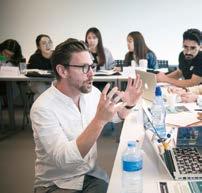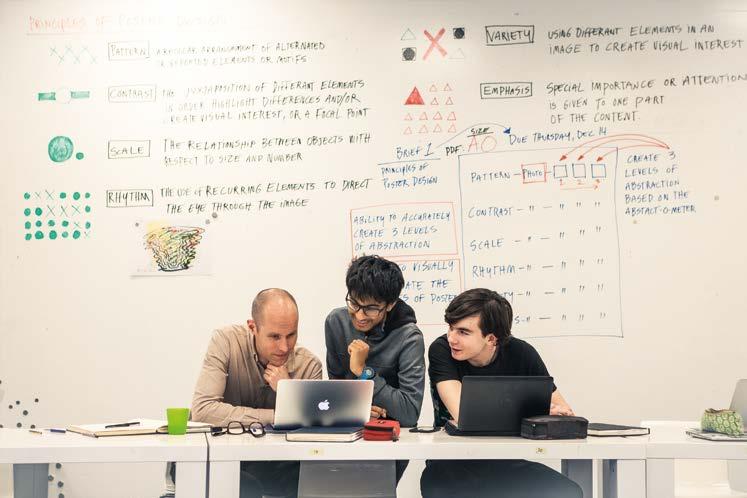
8 minute read
COLUMN
DUTCH EDUCATION: Even When You’re Sick, Just Act Normal
By Greg Shapiro and Inez de Goede
Advertisement
GREG: Hi! It’s me, Greg Shapiro: The American Netherlander. And this time it’s also my wife Inez de Goede; author and mother of our two kids. INEZ: The mother-who-always-gets-the-blame -when-things-go-wrong-with-her-child. GREG: Right. Inez has quite some experience with our 15-year-old son and his medical condition. Meanwhile, did you hear? Dutch teachers recently went on strike to protest unfair working conditions. I feel like some of those ‘conditions’ were kids with medical conditions. And hey, I’d go on strike too, if I could. Inez: Our son has Juvenile Idiopathic Arthritis. His diagnosis has been very complicated for the Dutch system. I mean, it’s a difficult situation for all of us. But instead of getting support, we were left to our own devices. No body, and I mean nobody, communicates with each other. So there you are, a parent with a sick child – with no background in medicine, psychology or education – and you’re supposed to coordinate doctors, school, psychologists, therapists and every body else who is making money with their so-called expertise, while you don’t, but you do get to organize the whole thing. GREG: Some context: the education system underwent a big change about ten years ago, right? I remember I was hired to perform at an event for school administrators, where the theme was “We’re removing the stigma of the term ‘Special Needs Child.’ From now on, we’ll treat all the kids the same!” Someone in the audience asked, “What about the kids who really do have special needs?” And the organizers had no good answer. INEZ: The Dutch system has no room for anything but the average child. Everything outside the box is labeled as problematic, and there is no solution for it but endless waiting lists and stigmas. It took me many phone calls and a lot of research to find out about our options. All the experts pointed us in different directions. GREG: No one treated you as an expert. INEZ: Since when are parents ever considered experts when it comes to their own child? In the end everyone seemed to say: just send him back to school and conform to the system. GREG: The motto of our son’s elementary school was ‘Become Who You Are’. But in practice it was Just Act Normal’.

INEZ: By now, our son is going to school full-time, he is able to do homework again, and participate in tests. All this has been achieved by lots and lots of counseling. GREG: Arranged by you. INEZ: And appointments at Reade Rehabilitation Center and Amsterdam UMC. It’s been a part-time job for me to accompany my son everywhere, negotiate for him and tutor him when he’s not able to go to school or meet his deadlines. His illness is not in remission yet (we are hopeful). He is still taking medication, and every adjustment takes a toll. So I am in constant contact with school to manage their expectations and to meet their regulations. GREG: Our son is studying at a high school specializing in the arts. So of course they have him studying economics & chemistry & physics. And okay I get it, those are part of the national curriculum. But when the academic coordinator says “Your son can miss some of those classes,” then why do they call up the next day threatening him for missing classes? INEZ: Last week I asked for some flexibility regarding deadlines and testing. “Not possible,” said the vice-principal, “we are taxed to the max, and my teachers cannot deal with any more exceptions. They need to keep an overview of what still needs to be done per child. And they get stressed out because they can’t check their boxes.” GREG: This is what happens when there are no more kids with ‘special needs’. Now everyone has special needs. INEZ: That’s what the vice-principal said: “We have a lot of children in our school with spe cial needs. It’s very complicated for the teachers, and we cannot accommodate children with an illness. We are just a regular school.” I asked: “Are you saying my son has to leave your school in case he has a relapse?” There was no clear reply. He says he adores our son and wants to keep him on board, but he also has to consider the teachers and their well-being. GREG: Children are the future... but teachers have a permanent contract. INEZ: Maybe I am too pessimistic. Maybe I shouldn’t worry about a relapse. But the fact that it could happen – and there is doubt about getting support and understanding from the school – is both stressful and infuriating. No child should ever have to be condemned to home for months or sometimes even years, because the regular school system is only capable of accommodating the average child.
ABOUT THE AUTHORS Inez de Goede (b. 1970) was born in Amsterdam and raised in France. She studied Cultural Anthropology and went to Film and Art school - for a while. She worked behind the scenes in theatre, met her famous husband at Boom Chicago, managed his career for 20 years, and is now preparing the release of her first novel in early 2021 with Orlando Publishers. Gregory Shapiro (b.1968) is the author of How to be Dutch: The Quiz and the voice of Trump in the viral video ‘Netherlands Second.’ In 2020 he celebrates 25 years as corporate speaker, event host and speaking coach. His show Trump Up the Volume can be seen at Boom Chicago. www.gregshapiro.nl
AUAS Summer School SIGN UP FOR THE SUMMER OF A LIFETIME Sign up for an experience to last your entire career! Meet new friends from around the globe, and experience the fascinating city of Amsterdam. Challenge yourself academically, and have a great time doing so.
Amsterdam, a cosmopolitan and vibrant city with a smallscale feel, welcomes you. You will be using Amsterdam as your laboratory, visiting both established (inter)national companies and start-ups, working together with social organizations and entrepreneurs, and interacting with the Amsterdammers.


Applied Sciences The AUAS stands out with its applied sciences by offering you an educational model that allows you to put theory into practice. You will receive top-of-the-bill education, learn new skills, and meet students from around the world.
Current Urban Topics The 15 two-week courses offered by the AUAS Summer School stress contemporary urban issues. Whether they are economic, environ mental, social or logistic. You will take home theory and skills you have learned during the summer school, and you will be able to apply them in your studies and career.
Our Summer Courses There are various amounts of European credits (ECTS) you can receive for our courses: regular versions for 3 or 4 ECTS and extended versions of 6 ECTS, which include an additional online assignment. The following courses are on offer: • Business of Sport Events and Music Festivals (4 & 6ECTS) • Capital Games Concepts (3ECTS) • Digital Brand Engagement (4 & 6ECTS) • Digital Design & Robotic Construction (4ECTS) • Educating Amsterdam: Diversity and the City (4ECTS) • European Business Skills (4 & 6ECTS) • Experimenting in Virtual Reality (4ECTS) • Practicing Human Rights in Urban Areas (3 & 6ECTS) • Professional English & Personal Branding (4ECTS) • Reversed City Marketing (4 & 6ECTS) • Software for Science (3ECTS) • Supply Chain Management (4 & 6ECTS) • Virtual Fashion Design: the new real (3ECTS) • Urban Entrepreneurship Bootcamp (4 & 6ECTS) • Urban Interaction Design: creating games for cities (4ECTS).
Housing Live like the local students in Amsterdam: arrange student housing in Amsterdam. Have your own private room, or share a flat with others. The student housing emphasizes independent living; expect to cook yourself or together with other students. Amsterdam is easy to traverse on bicycle; you’ll know your way around in no time. If you want the full experience for your summer, choose a student housing arrangement. This includes three options: • a private room arranged by the AUAS • a dorm-style room arranged by the AUAS • an arrangement of your own. More information on the accommodation types can be found on the website. When using the AUAS Summer School housing arrangement, the arrival date is Saturday July 4, 2020. If you do not wish to make use of the housing arranged by the AUAS Summer School, you are welcome to arrange your own accom modation. There are many ways to do so. Either through airBnB, through friends, in youth hostels or hotels, or through interna tional student boards. Please be aware that the summer is a busy time in Amsterdam, so make sure you book well in advance.
Partner Universities Students from AUAS’ partner universities are entitled to a discount on their tuition fee. This discount is additional to the possible early bird discount on applications before April 1, 2020. AUAS has hundreds of partner universities in over 50 countries.
More information More information can be found on the AUAS website, such as regarding the application procedure, general conditions, financial matters including cost of living, and visa arrangements.
JOIN US IN AMSTERDAM! For more information about the AUAS Summer School and its courses, please visit amsterdamuas.com/summerschool email: summerschool@amsterdamuas.com
To Educate for International Understanding

For over 50 years, the International School of Amsterdam (ISA) has been a global leader in the international education community fostering curiosity, creativity and a passion for learning.
Serving 1350students from over 60 countries, ISA combines a rich cultural heritage with world-class faculty and staff, inspiring students to look beyond simple answers and facts and to pursue a genuine understanding of the world.
We have built a tradition of excellence by pursuing innovative, research-based approaches to teaching and learning and develop our students' thinking skills and ability to help them learn how to learn.










